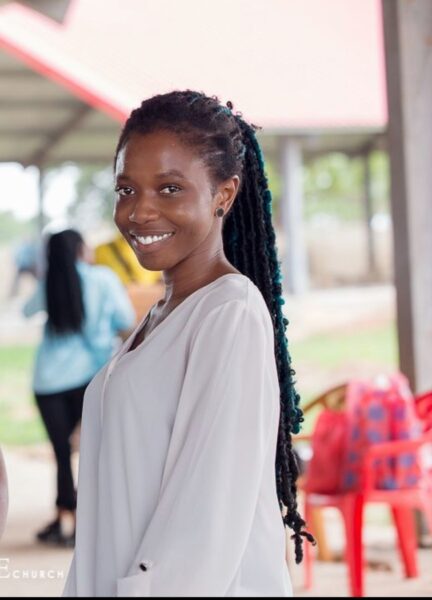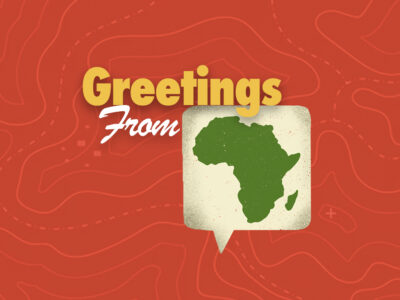
Sary nampindramin'i Cynthia Amoaba ary nahazoana alalana.
Ao anatin'ny andiany manasongadina ny asan'ireo mpikatroka mampiroborobo ny teny Afrikana amin'ny habaka ankihy, tianay ny hampiseho an'i Cynthia Amoaba (@thea_ceen) avy any Ghana. Teratany mpiteny Kusal izy.
Tamin'ny alalan'ny fisantaran'andraikitra Ghana Natural Language Processing, i Cynthia no niezaka ny hampitombo ny fisian'ny fiteny Ghaneana amin'ny habaka ankihy, manomboka amin'ny famoronana fampiharana fandikan-teny iray ka hatramin'ny fikarohana betsaka momba ireo fiteny ireo koa.
Vao haingana ny Rising Voices no nitafatafa tamin'i Cynthia tamin'ny alàlan'ny mailaka mba hahafantarana bebe kokoa momba ny asany.
Rising Voices (RV): Mba lazao anay ny momba anao azafady.
My name is Cynthia Amoaba from Ghana. I have been working with Ghana Natural Language processing for the past two years as a member of the data and unsupervised method teams and also the assistant head of communication.
Cynthia Amoaba no anarako ary avy any Ghana aho. Niara-niasa tamin'ny paikan'ny Ghana Natural Language aho nandritra ny roa taona amin'ny maha-mpikambana ao amin'ny ekipan'ny angona sy ny fomba ialàna amin'ny fanaraha-maso sady manampy ny filohan'ny serasera.
RV: Manao ahoana ny fiteninao amin'izao fotoana izao na anjotra na ivelan-jotra?
Currently the local languages are spoken by a larger percentage of people in Ghana than the official language which is English. Most of the local languages have little to no information written on them on the Internet. There is currently offline written material on 11 local languages written for use by schools. These resources are even limited for use by students and teachers.
Be kokoa amin'izao fotoana izao no mampiasa ny fiteny eo an-toerana ao Ghana noho ny fiteny ofisialy dia ny Anglisy. Zara raha misy torohay voasoratra momba ny ankamaroan'ny fiteny eo an-toerana ao amin'ny aterineto. Manana fitaovana ivelan-jotra voasoratra amin'izao fotoana izao ampiasaina any an-tsekoly ho an'ny fiteny fiteny 11 eo an-toerana. Na ireo fitaovana ireo aza dia voafetra ho an'ny mpianatra sy ny mpampianatra.
RV: Inona no antony manosika anao hahita ny fiteninao amin'ny sehatra ankihy?
Recently, there has been a realization that language technologies have been leaving certain languages behind – including most African languages. Ghana NLP is an Open Source Initiative focused on Natural Language Processing (NLP) of Ghanaian Languages, and its Applications to Local Problems. We released the first ever language translation app for Ghanaian Languages based in Artificial Intelligence. Our ultimate goal is for our tools to be applicable throughout the West African subregion and beyond.
Vao haingana, nisy ny fahatsapana fa nilaozan'ny teknôlôjian'ny fiteny ireo fiteny sasany – anisan'izany ny ankamaroan'ny fiteny Afrikana. Fisantarana andraikitra Open Source mifantoka amin'ny Fikarakarana ny fiteny voajanahary (NLP) amin'ny fiteny ghaneana Ghana NLP, sy ny fampihatra ao amin'ny manoloana ny olana eo an-toerana. Namoaka ny fampiharana fandikan-teny voalohany ho an'ny teny Ghaneana miorina amin'ny Haranitsan-tsaina Voatrolombelona izahay. Ny tanjonay farany ny mba ahazoana mampiasa ny fitaovanay manerana ny faritra Afrika Andrefana sy ny mihoatra izany.
RV: Sorito ny sasany amin'ireo fanamby manakana ny fiteninao tsy ho azo ampiasaina anjotra
One major challenge we face is funding to enable us undertake more research on our local languages as well as other African languages in the Natural Language Processing space.
Also, the media houses are not doing enough to support in spreading the news about the new digital solutions such as Khaya (the first translation app for Ghanaian languages). Khaya has been developed to help Ghanaians especially students, teachers and foreigners to learn, teach and to connect well with the Ghanaian Languages. Meanwhile, it would have been advertised or broadcasted on news platforms for free should it have been from a foreign organisation. The local support is nothing to write home about.
Ny fanamby lehibe iray atrehinay dia ny famatsiam-bola ahafahanay manao fikarohana bebe kokoa momba ny fiteninay eo an-toerana sy ny fiteny afrikanina hafa ao amin'ny habaka Fampivoarana ny fiteny voajanahary.
Ary tsy manao izay ho afany araka ny tokony ho izy hanohanana amin'ny fanapariahana ny vahaolana vaovao ankihy toy ny Khaya (fampiharana fandikan-teny voalohany ho an'ny teny Ghaneana) ireo trano fampahalalam-baovao. Novolavolaina Khaya hanampiana ireo Ghaneana, indrindra ireo mpianatra, mpampianatra ary vahiny hianatra, hampianatra ary hifandray tsara amin'ireo teny Ghaneana. Mandritra izany fotoana izany, dia tokony ho azo navoaka maimaim-poana tamin'ny sehatra fampahalalam-baovao izy io na dia avy amin'ny fikambanana vahiny aza. Tsy mampazoto loatra ny fanohanana eo an-toerana.
RV: Inona no dingana mivaingana araka ny hevitrao azo atao mba handrisihana ny tanora hanomboka hianatra ny fiteniny na hampiasa ny fiteniny hatrany?
The Ghanaian media platforms can help in advertising the digital tools which have been created to help in the learning and teaching of Ghanaian Languages. Also the Ghana Education Service should employ digital tools and resources to help make learning our local languages attractive and less laborious. This will expose students to digital knowledge as well as drive their curiosity to know how these resources are developed.
Afaka manampy ny sehatra media Ghaneana amin'ny fandokafana ireo fitaovana ankihy noforonina hanampiana amin'ny fianarana sy fampianarana ireo fiteny Ghaneana. Tokony hampiasa fitaovana sy loharano ankihy ihany koa ny Sampan-draharahan'ny Fanabeazam-pirenena eto Ghana mba hahatonga ny fianarana ny fiteninay hahasarika sy tsy dia manahirana. Hitondra ny mpianatra hiatrika ny fahalalana nomerika (ankihy) izany sady hitarika koa ny fahalianan'izy hahafantatra ny fomba famolavolana ireo fitaovana ireo.





